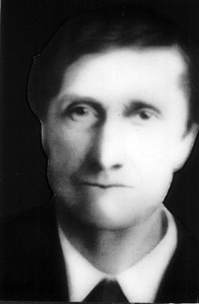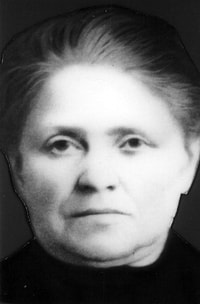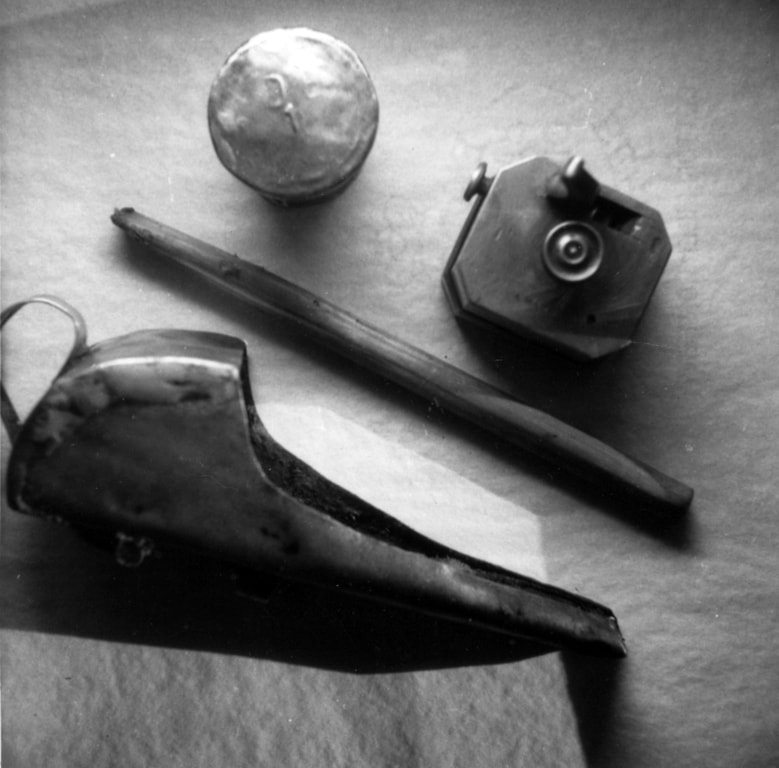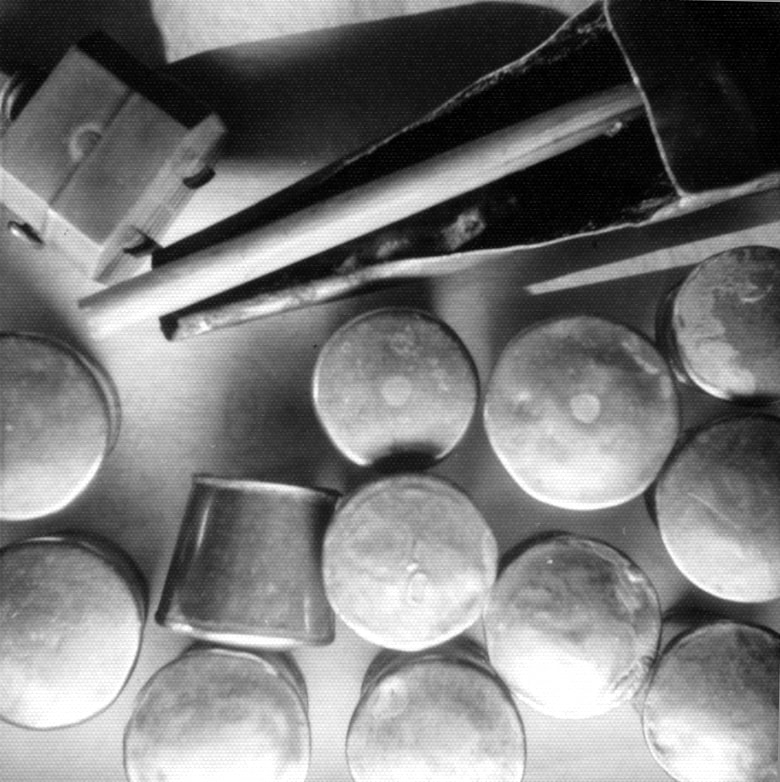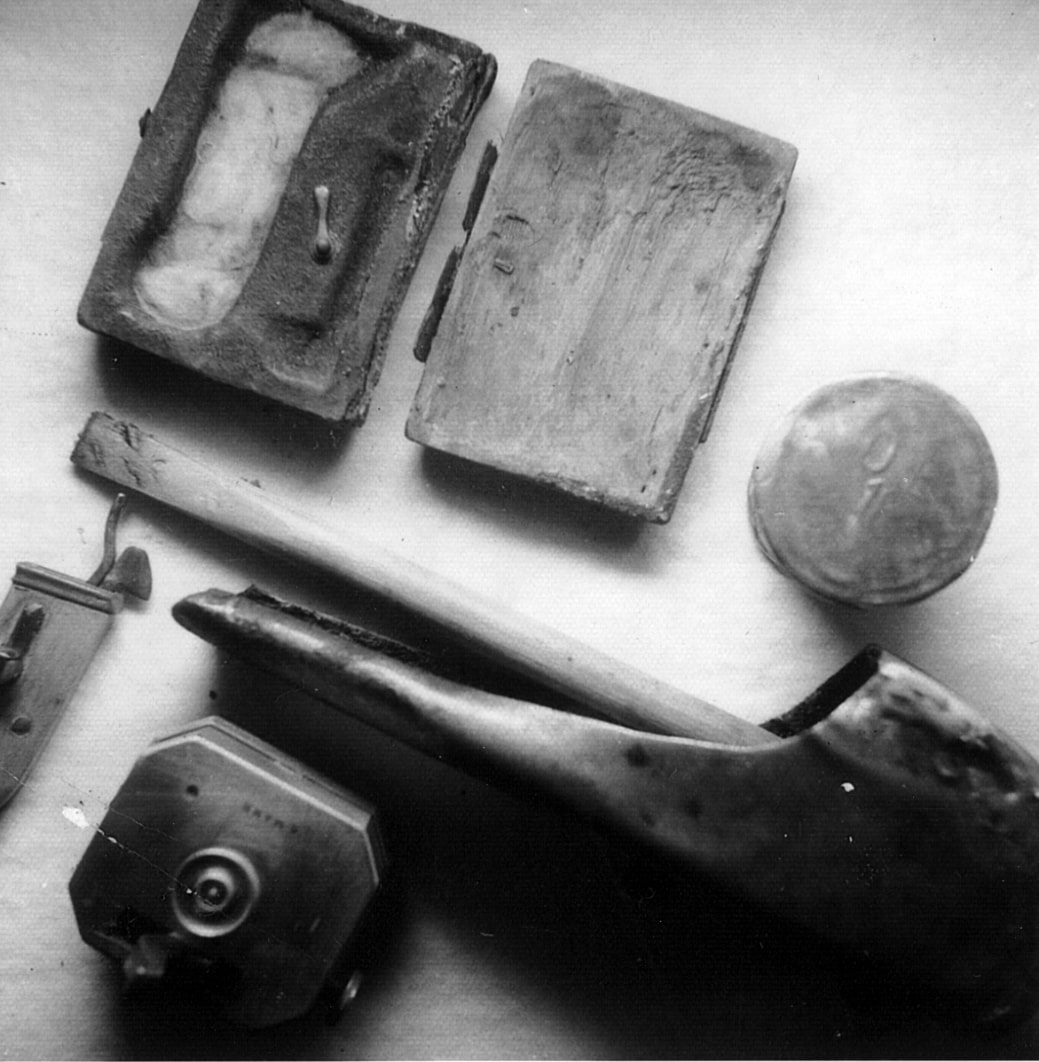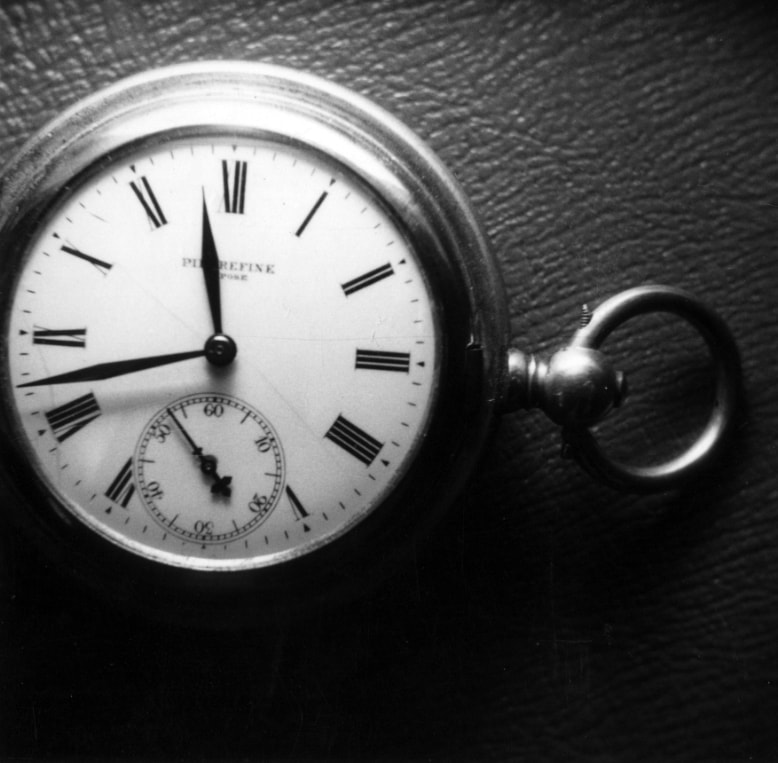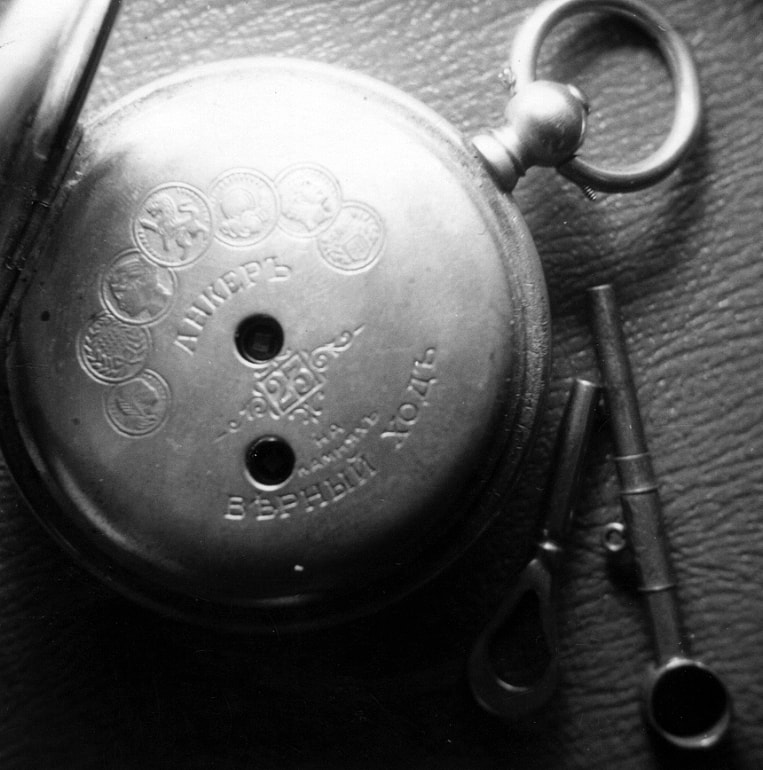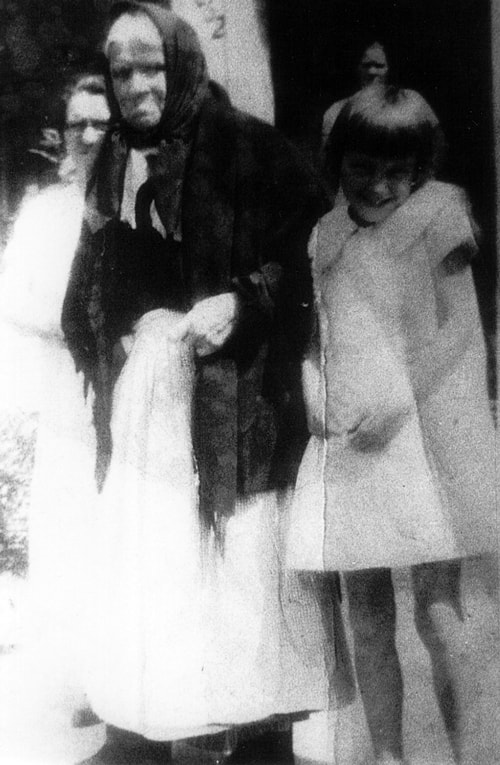People > Our People > Conrad and Catharina Weber
Conrad and Catharina Weber
Conrad Weber was born in Norka, Russia, on November 9, 1850. Conrad is the son of Johannes Weber and Margaretha Jost. In 1882, Conrad married Catherina Dörr (Derr), born August 14, 1858 in Norka. Catharina is the daughter of George Heinrich Dörr and Anna Elizabeth Wolf. Catharina was previously married and had two daughters from that marriage. Conrad had also been married previously to Anna Margaretha Schmer, who died in 1881, and they had two sons and three daughters born between 1872 and 1880 in Norka.
Conrad and Catharina would become parents to eight children: Nicholas ("Nick"), born on November 11, 1883; Catharina Christina born on May 15, 1884; Johann Georg born on February 9, 1885; Catharina Elizabeth, born on August 20, 1887, Anna Elizabeth born on April 10, 1889, Elizabeth born on June 23, 1891, Conrad born on December 22, 1893, and Catherina Maria born on April 4, 1896.
Two of their children died at a young age. Johann Georg died on March 30, 1891, and Catharina Elizabeth died on March 20, 1891.
Conrad was a farmer and made wagon wheels. He also practiced folk medicine in Russia. He was known throughout the region for his healing skills. Conrad Brill mentions the "Schreffing" (bloodletting) skills of his uncle Conrad Weber in his story titled "Memories of Norka." Family stories tell of Russian families coming to Conrad for help, and he would be away from home for several weeks to provide assistance. One of his daughters often accompanied her father during his travels.
Two of their children died at a young age. Johann Georg died on March 30, 1891, and Catharina Elizabeth died on March 20, 1891.
Conrad was a farmer and made wagon wheels. He also practiced folk medicine in Russia. He was known throughout the region for his healing skills. Conrad Brill mentions the "Schreffing" (bloodletting) skills of his uncle Conrad Weber in his story titled "Memories of Norka." Family stories tell of Russian families coming to Conrad for help, and he would be away from home for several weeks to provide assistance. One of his daughters often accompanied her father during his travels.
Like many families in Norka, the Webers wove sarpinka cloth (similar to gingham) on looms at home and sold it in the city of Saratov.
Conrad and Catharina, their daughter Catharina Maria, and son Nicholas immigrated to North America in 1913. Nicholas traveled with his wife Christina (nee Weber) and sons Phillip, John, and Conrad. Christina gave birth to another child on the journey to America, and Nicholas helped deliver the baby.
Conrad and Catharina, their daughter Catharina Maria, and son Nicholas immigrated to North America in 1913. Nicholas traveled with his wife Christina (nee Weber) and sons Phillip, John, and Conrad. Christina gave birth to another child on the journey to America, and Nicholas helped deliver the baby.
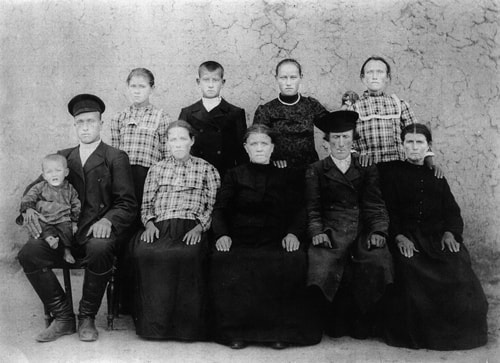
Photograph of the Conrad and Catharina Weber family taken in Norka, Russia about 1909.
Front row from left to right: Nicholas "Nick" Weber holding his son Phillip Weber (born 1907), Christina Weber (nee Weber), Catharina Weber (nee Dörr), Conrad Weber, Elisabeth "Dimmi" Schleining (sister of Catharina Weber). Courtesy of Pat Hefflin.
Back row from left to right: Magdalena Weber, Conrad Weber (born 1893), Anna Elizabeth "Annalise" Weber, Katherine Weber.
Initially, Conrad and Catharina wanted to stay in Norka. They were no longer young and felt satisfied with their lives. However, their son Nicholas has been conscripted into the Russian military to serve in the Russo-Japanese War.
Nicholas served two years before gaining permission to return home to help support his family because his younger brother Conrad had emigrated in 1912. Nicholas could see that change was coming to Russia, and the European continent would soon be engaged in war. Nicholas sought passports for the entire family and arranged for them to emigrate from Russia.
The trip was complicated because Christina suffered from cataracts, and the elder Conrad also had health problems. Due to their health problems, they were not allowed to board the ship. Nicholas worked tirelessly to overcome their problems and ensure that all the arrangements were made so they could board the ship. They saw a smaller immigrant ship that had begun to sink during the Atlantic crossing. The passengers from this ship were rescued, but the family remained fearful about the remainder of their ocean voyage. Family stories tell that Catharina Maria promised God that she would never dance again if their boat did not sink, and she honored that promise for the rest of her life.
The family sailed from Southhampton, England, on August 28th aboard the steamship Ascania of the Cunard Line and arrived in Quebec, Canada, on September 7, 1913. They traveled by train on the Grand Trunk Railroad from Quebec and entered the United States at Port Huron, Michigan, on September 8, 1913. From Port Huron, the family continued their journey by train to Portland, Oregon. The U.S. Border Crossing list states that Conrad and Catharina are going to the home of Conrad's daughter and son-in-law, Catherine Elizabeth (née Weber) and Heinrich Lehl, at 836 Mallory Ave. Another of Conrad's daughters from his first marriage, Anna Maria, married Philip Hohnstein and resided in Portland.
Three of Catharina and Conrad's daughters settled in Portland; Anna Elizabeth married Henry Arndt, Magdalena married William Helzer, and Katharina married Henry Hefenieder. The fourth daughter, Elizabeth, married a Schleining and remained in Russia.
Catharina and Conrad's son, Conrad, had arrived in Portland a year earlier and settled in the Albina neighborhood.
Catharina had two sisters living in Portland, Louise Schreiber (born in 1861 and married to Heinrich Schreiber) and Lena Weidenkeller. A third sister, Dimmi Schleining, remained in Russia.
In the 1920 U.S. Census, Conrad and Christina are shown living with their son and daughter-in-law, Conrad and Christina Weber, at 830 Union Avenue North. Two grandchildren, Katie and Edward, also lived in the household.
While they had traveled nearly halfway around the world, Conrad and Christina were surrounded by friends and family from Norka in the New World.
Conrad Weber died on June 17, 1923, in Portland, Oregon, and was buried at the Rose City Cemetery. At the time of his death, he and Catharina lived at 3606 NE Rodney and were members of the Zion Congregational Church.
Nicholas served two years before gaining permission to return home to help support his family because his younger brother Conrad had emigrated in 1912. Nicholas could see that change was coming to Russia, and the European continent would soon be engaged in war. Nicholas sought passports for the entire family and arranged for them to emigrate from Russia.
The trip was complicated because Christina suffered from cataracts, and the elder Conrad also had health problems. Due to their health problems, they were not allowed to board the ship. Nicholas worked tirelessly to overcome their problems and ensure that all the arrangements were made so they could board the ship. They saw a smaller immigrant ship that had begun to sink during the Atlantic crossing. The passengers from this ship were rescued, but the family remained fearful about the remainder of their ocean voyage. Family stories tell that Catharina Maria promised God that she would never dance again if their boat did not sink, and she honored that promise for the rest of her life.
The family sailed from Southhampton, England, on August 28th aboard the steamship Ascania of the Cunard Line and arrived in Quebec, Canada, on September 7, 1913. They traveled by train on the Grand Trunk Railroad from Quebec and entered the United States at Port Huron, Michigan, on September 8, 1913. From Port Huron, the family continued their journey by train to Portland, Oregon. The U.S. Border Crossing list states that Conrad and Catharina are going to the home of Conrad's daughter and son-in-law, Catherine Elizabeth (née Weber) and Heinrich Lehl, at 836 Mallory Ave. Another of Conrad's daughters from his first marriage, Anna Maria, married Philip Hohnstein and resided in Portland.
Three of Catharina and Conrad's daughters settled in Portland; Anna Elizabeth married Henry Arndt, Magdalena married William Helzer, and Katharina married Henry Hefenieder. The fourth daughter, Elizabeth, married a Schleining and remained in Russia.
Catharina and Conrad's son, Conrad, had arrived in Portland a year earlier and settled in the Albina neighborhood.
Catharina had two sisters living in Portland, Louise Schreiber (born in 1861 and married to Heinrich Schreiber) and Lena Weidenkeller. A third sister, Dimmi Schleining, remained in Russia.
In the 1920 U.S. Census, Conrad and Christina are shown living with their son and daughter-in-law, Conrad and Christina Weber, at 830 Union Avenue North. Two grandchildren, Katie and Edward, also lived in the household.
While they had traveled nearly halfway around the world, Conrad and Christina were surrounded by friends and family from Norka in the New World.
Conrad Weber died on June 17, 1923, in Portland, Oregon, and was buried at the Rose City Cemetery. At the time of his death, he and Catharina lived at 3606 NE Rodney and were members of the Zion Congregational Church.
Catharina continued to live with her son Conrad's family. Two more granddaughters, Esther and Marie, had joined the household. When the 1930 U.S. Census was taken (on April 7 and 8), they lived at 762 Rodney Avenue. Catharina's other son, Nick (and his family), lived next door at 760 Rodney Avenue.
Catharina Weber died in 1930 in Portland, Oregon, at the age of 72 and is also buried at the Rose City Cemetery. Her obituary was written by Pastor Conrad J. Wagner.
Catharina Weber died in 1930 in Portland, Oregon, at the age of 72 and is also buried at the Rose City Cemetery. Her obituary was written by Pastor Conrad J. Wagner.
Sources
Information and photographs courtesy of Pat Hefflin.
Ancestry.com
Ancestry.com
Last updated October 26, 2023
